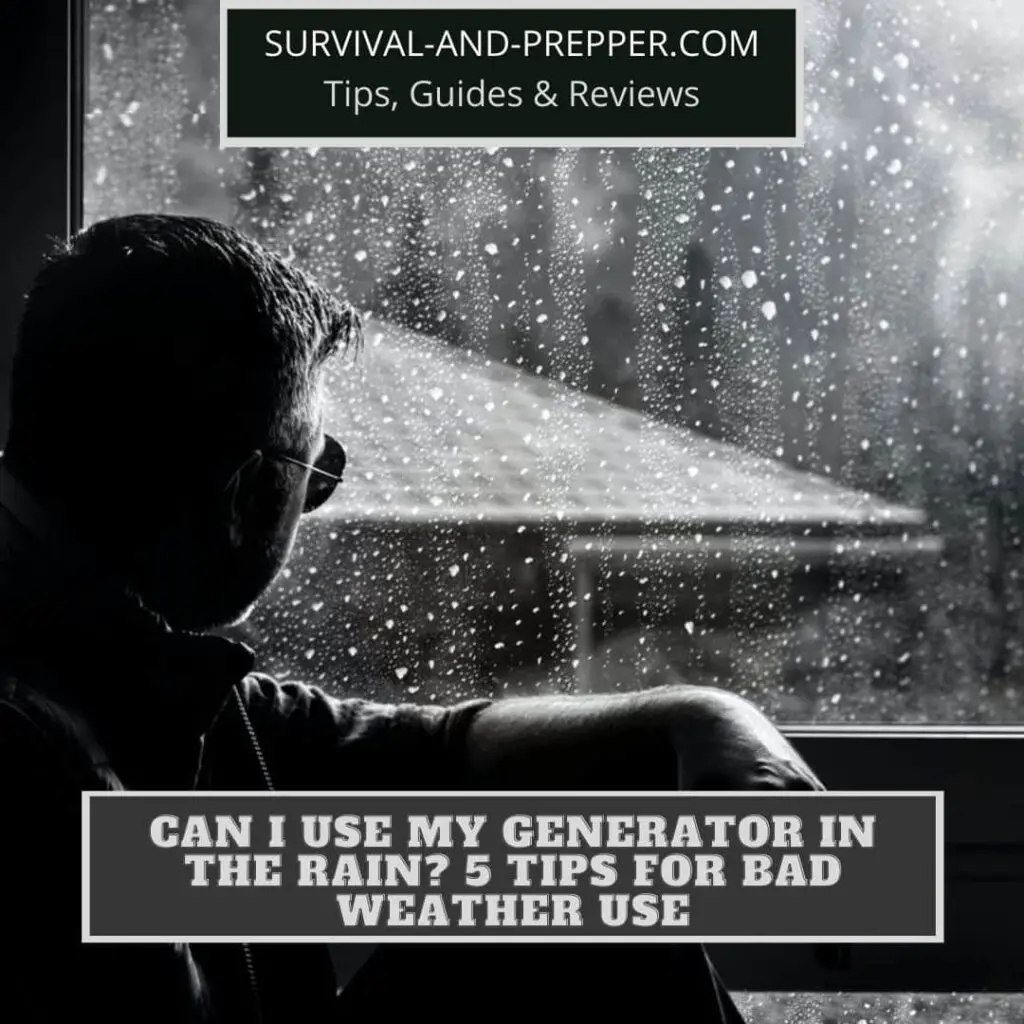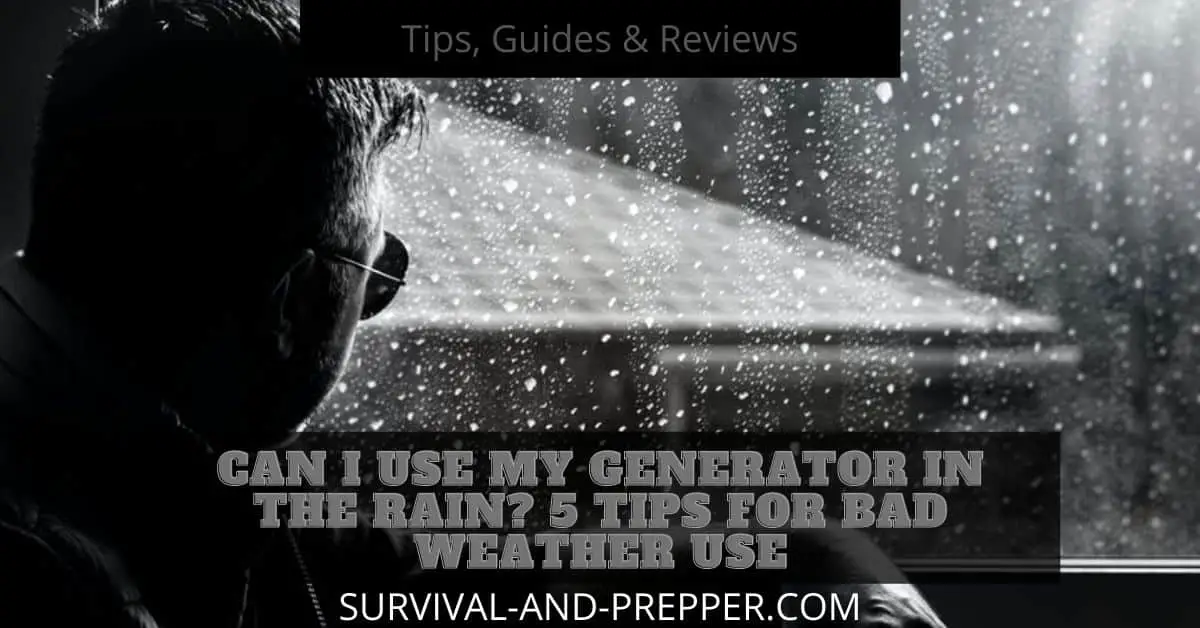Can I Use My Generator in the Rain? 5 Tips for Bad Weather Use
With some careful preparation you can use a portable generator when it is raining or in other less than favorable conditions. Cover the generator to protect it from the rain, make sure that it is properly grounded and that none of your electrical parts are in pooling water.
Why Is Rain a Factor That Affects My Use of a Portable Generator?
If new to generators then you may be wondering why rain would hurt your generator. After all, plenty of gasoline powered devices are safe to use in the rain.
In the case of a generator the greater danger tends to be more towards yourself than the generator. This largely stems from the dangers associated with mixing electricity and water.
Even the smallest of generators can deliver a substantial shock if they become short circuited by water. In most instances it should be considered unsafe for you to operate a generator in wet conditions.
However, despite the dangers to yourself a generator could become damaged as well. Water being taken into either the intake or exhaust ports will likely cause the engine to seize up. Additionally water exposure on electrical components such as plugs and inverters could cause potential short circuits and melted components.
These are all reasons why it is important to use caution when operating a generator around any form of water.
Top 50 Gift Ideas for Preppers, Survivalists and Outdoorsmen
When Is It Ok to Run a Generator in the Rain?
With everything in life there is a series of checks and balances. Sometimes the dangers presented by an action are more than offset by the needs to perform that action.
For instance in the case of using a generator in the rain, it is dangerous to operate a generator in the rain but what if that is the only way to provide refrigeration for your food, or to operate equipment necessary for the preservation of life.
While it may be necessary to operate your generator in the rain, keep in mind the dangers it presents. Remember that it is possible to find ways to make that action safe to do. By taking a few simple steps you can in fact safely operate a generator in the rain.
What do you think, is running your generator in the rain worth the risks? Keep in mind that nearly every case of power failure usually stems from damage to power lines brought on by rain and thunderstorms. Have you considered what you would do to protect your generator if it was raining?
Camping with an RV – as a Survivalist
5 Tips That Help Ensure Safe Operation of a Generator in the Rain
The main danger of using a generator in wet conditions comes from the possibility of electricity and water mixing. This could cause the electricity to travel along the wet surface and deliver a shock a significant distance away from the generator itself. In order to prevent that we are going to discuss four aspects of power generation that you should examine.
- Protect the Generator Itself By Covering It
The first thing to consider is the location of your generator. You want to ensure that it is protected from the rain as much as possible.
Some options for this include a dedicated storage shed. You could also use a pop up tent or canopy for short term needs. By protecting the generator from water you will minimize possibilities of electrocution, short circuited electronics and water in the intake system of the generator itself.
Keep in mind that a generator will vibrate significantly when running. Because of this coupled with the slipper surface common with rain it is important to select a flat location. This way your generator is not likely to slide down a hill or out from under its shelter.
- The Exhaust Gases of the Generator
If we just need to shield the generator from the rain we can place it in the garage or basement correct?
No! You should never place a running generator in your garage or basement as neither of these locations are properly vented. If you attempt to run a generator in either of these places you could be exposing yourself or your family to dangerous carbon monoxide.
- Properly Ground Your Generator to Avoid Shock
The dangers of electrical shock greatly increase when dealing with an ungrounded circuit. In many cases it is sufficient to just have the generator frame in contact with the ground. However, if you are able to it is better to take additional steps to ground the generator.
A short piece of copper rod driven into the ground near your normal operating area and connected to the generator frame by a piece of copper rod or grounding straps is always a good idea for permanent installs.
An option for temporary use is a long metal tent spike as a grounding rod. Couple this with a short piece copper wire attached to the grounding bolt on your generator.
Some generator models do not need to be grounded, check your manufacturer’s instructions to determine if you should ground yours.
- Store the Fuel Supply of the Generator in a Dry Area
Depending on how long you are going to need to run your generator fuel may be a concern. Unless you have a propane generator or a very large fuel tank it is unlikely that you will be able to run your generator for more than 8-12 hours.
Therefore you are going to need some reserve fuel. Wherever you are storing your generator you need to make sure it is safe to also store this extra fuel. If it becomes necessary to use this fuel can you do so safely? Keep in mind the weather conditions present at the time.
For example if I am running my generator in the driveway with a sports canopy over it I will need to carry the fuel through the pouring rain to add it to the generator.
If so is that going to expose the generator to water coming off my person or the fuel can? Can I mitigate that danger somehow?
- Power Transmission Cords from the Generator to the Device Using the Power
Most of the time when dealing with a portable generator you are going to be connecting it to the appliances through the use of a drop cord or extension cable. There are a few considerations for the deployment of these as well.
Make sure to elevate any plugs off of the ground slightly. If they are exposed to the rain they should be waterproofed first. You can get special connecting sleeves or even wrap them with electrical tape if it is going to be an extended time.
Make sure that each end has a drip loop before reaching the generator or appliance. This loop is a short portion of the cord hanging down below the electrical portion of the generator or appliance. These loops will allow the water to drip from the cord instead of running onto the electrical components. This will help minimize electrical shock hazards.
If possible use a cord that is properly sized, both in gauge and in length. Gauge is the thickness of the wire. A heavier wire can carry more current and will reduce heat build up. Longer wires than necessary can cause unneeded draws on your generator.
This unneeded draw could result in additional strain on the generator or insufficient output for your needs.
Recap of Generator Use in the Rain
To recap the use of a generator in the rain while dangerous, is a task that can be carried out in relative safety. You just need to employ a few safety processes.
Remember to ground your generator and place it in a covered location. There is adequate ventilation for its operation. Extra fuel should be safely stored. Finally check that your power cords are properly sized and positioned with drip loops. All of these steps will prevent unwanted water exposure to your electronics or generator.
I hope you found the information here useful. Do you have any other tips for operating a generator safely? If so include them down below. While you are here please check out some of our other articles and let me know you enjoyed the site.







